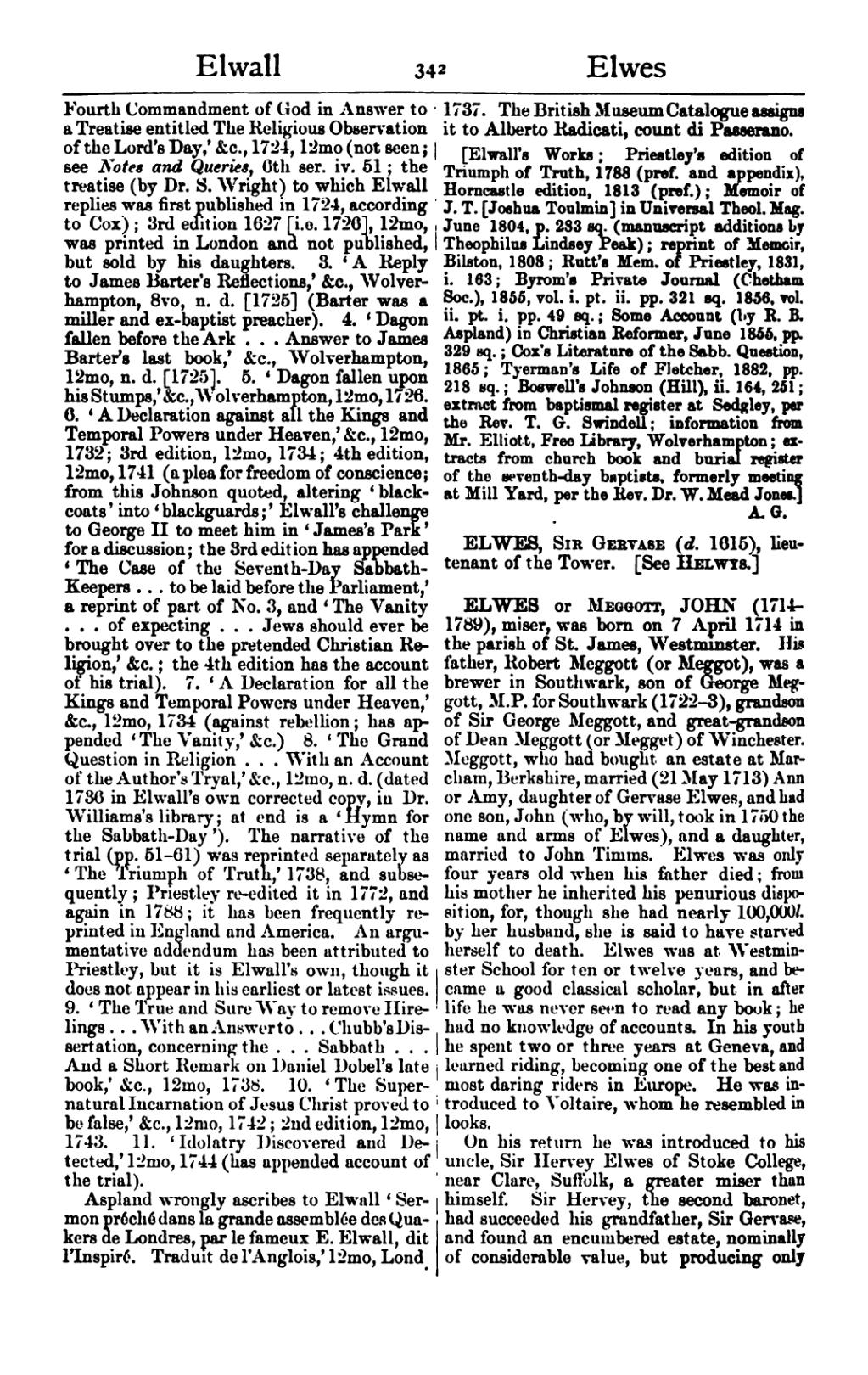Fourth Commandment of God in Answer to a Treatise entitled The Religious Observation of the Lord's Day,’ &c., 1724, 12mo (not seen; see Notes and Queries, 6th ser. iv. 51; the treatise (by Dr. S. Wright) to which Elwall replies was first published in 1724, according to Cox); 3rd edition 1627 [i.e. 1726], 12mo, was printed in London and not published, but sold by his daughters. 3. ‘A Reply to James Barter's Reflections,’ &c., Wolverhampton, 8vo, n. d. [1725] (Barter was a miller and ex-baptist preacher). 4. ‘Dagon fallen before the Ark … Answer to James Barter's last book,’ &c., Wolverhampton, 12mo, n. d. [1725]. 5. ‘Dagon fallen upon his Stumps,’ &c., Wolverhampton, 12mo, 1726. 6. ‘A Declaration against all the Kings and Temporal Powers under Heaven,’ &c., 12mo, 1732; 3rd edition, 12mo, 1734; 4th edition, 12mo, 1741 (a plea for freedom of conscience; from this Johnson quoted, altering ‘blackcoats’ into ‘blackguards;’ Elwall's challenge to George II to meet him in ‘James's Park’ for a discussion; the 3rd edition has appended ‘The Case of the Seventh-Day Sabbath-Keepers … to be laid before the Parliament,’ a reprint of part of No. 3, and ‘The Vanity … of expecting … Jews should ever be brought over to the pretended Christian Religion,’ &c.; the 4th edition has the account of his trial). 7. ‘A Declaration for all the Kings and Temporal Powers under Heaven,’ &c., 12mo, 1734 (against rebellion; has appended ‘The Vanity,’ &c.). 8. ‘The Grand Question in Religion … With an Account of the Author's Tryal,’ &c., 12mo, n. d. (dated 1736 in Elwall's own corrected copy, in Dr. Williams's library; at end is a ‘Hymn for the Sabbath-Day’). The narrative of the trial (pp. 51–61) was reprinted separately as ‘The Triumph of Truth,’ 1738, and subsequently; Priestley re-edited it in 1772, and again in 1788; it has been frequently reprinted in England and America. An argumentative addendum has been attributed to Priestley, but it is Elwall's own, though it does not appear in his earliest or latest issues. 9. ‘The True and Sure Way to remove Hirelings … With an Answer to … Chubb's Dissertation, concerning the … Sabbath … And a Short Remark on Daniel Dobel's late book,’ &c., 12mo, 1738. 10. ‘The Supernatural Incarnation of Jesus Christ proved to be false,’ &c., 12mo, 1742; 2nd edition, 12mo, 1743. 11. ‘Idolatry Discovered and Detected,’ 12mo, 1744 (has appended account of the trial).
Aspland wrongly ascribes to Elwall ‘Sermon préché dans la grande assemblée des Quakers de Londres, par le fameux E. Elwall, dit l'Inspiré. Traduit de l'Anglois,’ 12mo, Lond. 1737. The British Museum Catalogue assigns it to Alberto Radicati, count di Passerano.
[Elwall's Works; Priestley's edition of Triumph of Truth, 1788 (pref. and appendix), Horncastle edition, 1813 (pref.); Memoir by J. T. [Joshua Toulmin] in Universal Theol. Mag. June 1804, p. 283 sq. (manuscript additions by Theophilus Lindsey Peak); reprint of Memoir, Bilston, 1808; Rutt's Mem. of Priestley, 1831, i. 163; Byrom's Private Journal (Chetham Soc.), 1855, vol. i. pt. ii. pp. 321 sq. 1856, vol. ii. pt. i. pp. 49 sq.; Some Account (by R. B. Aspland) in Christian Reformer, June 1855, pp. 329 sq.; Cox's Literature of the Sabb. Question, 1865; Tyerman's Life of Fletcher, 1882, pp. 218 sq.; Boswell's Johnson (Hill), ii. 164, 251; extract from baptismal register at Sedgley, per the Rev. T. G. Swindell; information from Mr. Elliott, Free Library, Wolverhampton; extracts from church book and burial register of the seventh-day baptists, formerly meeting at Mill Yard, per the Rev. Dr. W. Mead Jones.]
ELWES, Sir Gervase (d. 1615), lieutenant of the Tower. [See Helwys.]
ELWES or Meggott, JOHN (1714–1789), miser, was born on 7 April 1714 in the parish of St. James, Westminster. His father, Robert Meggott (or Meggot), was a brewer in Southwark, son of George Meggott, M.P. for Southwark (1722–3), grandson of Sir George Meggott, and great-grandson of Dean Meggott (or Megget) of Winchester. Meggott, who had bought an estate at Marcham, Berkshire, married (21 May 1713) Ann or Amy, daughter of Gervase Elwes, and had one son, John (who, by will, took in 1750 the name and arms of Elwes), and a daughter, married to John Timms. Elwes was only four years old when his father died; from his mother he inherited his penurious disposition, for, though she had nearly 100,000l. by her husband, she is said to have starved herself to death. Elwes was at Westminster School for ten or twelve years, and became a good classical scholar, but in after life he was never seen to read any book; he had no knowledge of accounts. In his youth he spent two or three years at Geneva, and learned riding, becoming one of the best and most daring riders in Europe. He was introduced to Voltaire, whom he resembled in looks.
On his return he was introduced to his uncle, Sir Hervey Elwes of Stoke College, near Clare, Suffolk, a greater miser than himself. Sir Hervey, the second baronet, had succeeded his grandfather, Sir Gervase, and found an encumbered estate, nominally of considerable value, but producing only
